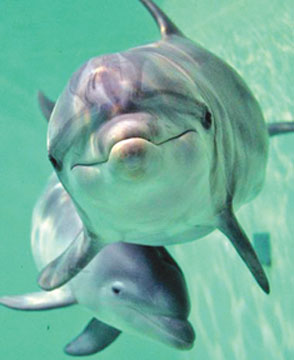Whales and dolphins deserve same rights as humans, say experts
Marine biologists and philosophers have joined forces to support a
controversial declaration of rights for whales and dolphins on the
grounds that their astonishing intelligence and emotional empathy puts
them on a par with humans.
Research into the complex behaviour of cetaceans - whales, dolphins
and porpoises - is revealing that these sea mammals are so highly
evolved and complex in terms of their behaviour that they deserve
special protection with a universal bill of rights, they said.
Dolphins and whales have complex vocal communications and are able to
learn an astonishing variety of behaviours when they come into contact
with humans, such as cooperative fishing with native fishermen.
The proponents of the bill of rights argue the cetacean mind is so
advanced and self-aware that whales and dolphins should be classified as
“non-human persons” who deserve the right to life, liberty and
wellbeing.
 “A
person needs to be an individual,” said Tom White, a philosopher at the
Hilton Centre for Business in Los Angeles. “A
person needs to be an individual,” said Tom White, a philosopher at the
Hilton Centre for Business in Los Angeles.
“If individuals count then the deliberate killing of individuals of
this sort is ethically the equivalent of deliberately killing a human
being.
“The captivity of beings of this sort particularly in conditions that
would not allow for a decent life is ethically unacceptable, commercial
whaling is ethically unacceptable.
You can't say its all about the size of the population.
We're saying the science has shown that individuality, consciousness,
self-awareness is no longer a unique human property. That poses all
kinds of challenges.”
The declaration of rights for cetaceans states that every individual
dolphin, whale and porpoise has the right to life and liberty and that
not only should they not be killed by hunting, but none should be kept
in captivity or servitude or subject to cruel treatment.
It states that no cetacean can be the property of any individual or
government and calls for the legal protection of their natural
environment and a ban on any activity that disrupts their “cultures”,
which could include underwater military sonar that disturbs their
acoustic communications.
“The similarities between cetaceans and humans are such that, like
us, they have an individual sense of self.
We can look internally and say that we have emotions, personality and
sense of self.
They do as well,” said Dr White. “What we see in cetaceans is that
humans need individual freedom more than whales and dolphins. But
dolphins need social life more.
When I look at captive animals I don't say, ‘gee, they've got no
freedom’, I say, ‘they have no social life'.”Lori Marino, of Emory
University in Atlanta, said people can support the call for a bill of
cetacean rights by not going to sea life parks that keep dolphins,
porpoises or whales. “Once you shift from seeing a being as a property
... to a person, an autonomous entity that has a right to life on his or
her own terms, the whole framework shifts,” she said.
Let's take a moment to marvel at their staggering feats and brilliant
brainpower.
Elephants
They have good memories but have also been observed using tools and
showing empathy, evidence of a higher form of intelligence.
Pigeons
These pestilent crumb munchers can identify themselves in mirrors and
distinguish between objects.
Crows
Bird-brained but brilliant crows can place nuts in streets to be
cracked under cars, retrieving the spoils after the traffic lights have
changed.
Horses
Clever Hans wowed early 20th-century audiences with feats of
arithmetic. A commission later found the German horse, while clever, was
no genius.
Dolphins
Bottlenoses off Brazil drive fish towards fishermen and then swim
away, nabbing lunch as they go.
Chimps
Ayumu makes his scientist handlers look stupid. When shown numbers on
a screen for half a second, the Japanese chimp can then trace their
position in perfect sequence.
Pigs
Sows in Essex have learned to “borrow” the electronic collars of
other pigs to gain cheeky seconds from their computerised feeding
system.
Dogs
Uggie, The Artist star, is a master of tricks but can't out-smart
Chaser, a collie from South Carolina, who has learnt the names of 1,000
objects.
Rats
They can navigate mazes and trip levers for food but scientists in
Los Angeles showed in 2006 that rats can also distinguish cause from
coincidence.
Octopuses
Paul, the octopus who predicted results during the 2010 World Cup,
wasn't psychic but his kind can open jars or valves to their tanks (one
flooded a Santa Monica aquarium).
The Independent
|

